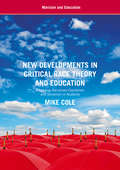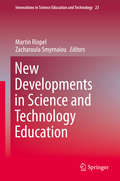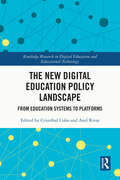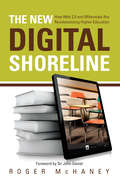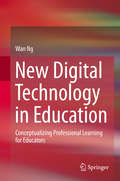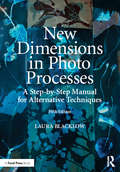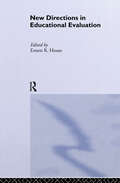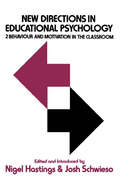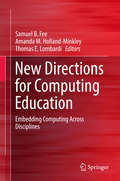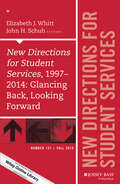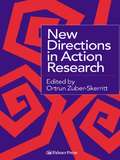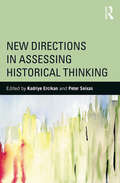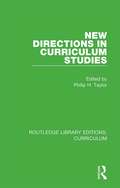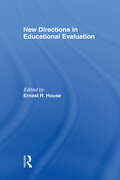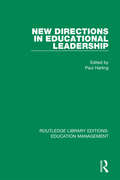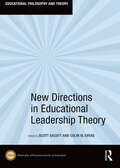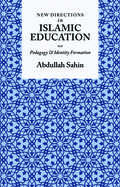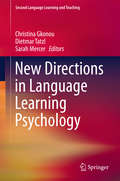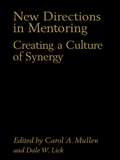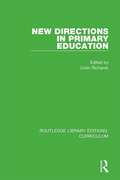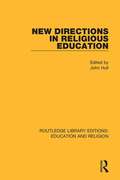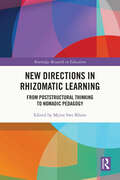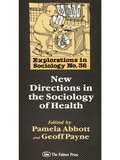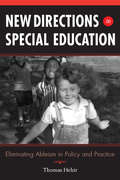- Table View
- List View
New Developments in Critical Race Theory and Education: Revisiting Racialized Capitalism and Socialism in Austerity (Marxism and Education)
by Mike ColeThis book considers new developments in Critical Race Theory (CRT) in times of austerity and assesses both the impact of British CRT or ‘BritCrit’, and CRT’s continuing growth in the US. Following transatlantic impact of the first and only book-length response from a Marxist perspective—Critical Race Theory and Education: A Marxist Response—Cole includes a retrospective critique and development of certain arguments in that volume; an evaluation of the influential ‘Race Traitor’ movement, including observations on the (changing) political perspectives of Ignatiev and Garvey; and reflections on racialized neoliberal capitalism in the era of austerity and immiseration. While acknowledging CRT’s strengths, this book stresses the need for (neo-) Marxist analysis to fully understand and challenge racism in the UK and the US and to envision a socialism for the twenty-first century.
New Developments in Science and Technology Education
by Martin Riopel Zacharoula SmyrnaiouThis book explores the beneficial impact of pedagogically updated practices and approaches in the teaching of science concepts as well as elaborates on future challenges and emerging issues that address Science and Technology Education. By pointing out new research directions it informs educational practices and bridges the gap between research and practice providing information, ideas and new perspectives. The book also promotes discussions and networking among scientists and stakeholders such as researchers, professors, students and companies developing educational software and ICT tools. The volume presents papers from the First International Conference on "New Developments in Science and Technology Education" (1st NDSTE) that was structured around four main thematic axes Modern Pedagogies in Science and Technology Education, New Technologies in Science and Technology Education, Teaching and Learning in the light of Inquiry learning Methods and Interest, Attitude and Motivation in Science.
The New Digital Education Policy Landscape: From Education Systems to Platforms (Routledge Research in Digital Education and Educational Technology)
by Cristóbal Cobo Axel RivasThis book provides a scholarly investigation of the new era we have entered, in which platforms can replace or profoundly modify educational systems, and questions the role of educational policy in this new stage of platform-based digital technology. The contributors explore important questions around who controls these transformations, what form they are taking, what the balance between national education policies and Big Tech education solutions should be, as well as whether there should be a public platform in every education system that digitally expands learning, and what evidence there is that learning will be more efficient using these platforms. The first part provides a selection of empirical studies on the new digital educational policy, and an analysis of the real opportunities and concerns that governments face in this regard, while the second offers reflections on the processes of platformization and the role of the State in this new digital world. Uniquely examining the temporal evolution of these changes and taking a theoretical, political, and epistemological approach, it crucially opens pathways for dialogical, and diverse critical thinking about profound problems and possibilities. Gathering purposeful thinking that creates space for design solutions and rethinking educational systems considering these new technological artifacts, it will appeal to researchers and specialists in the fields of educational technology and educational policy.
The New Digital Shoreline: How Web 2.0 and Millennials Are Revolutionizing Higher Education
by Roger McHaneyTwo seismic forces beyond our control – the advent of Web 2.0 and the inexorable influx of tech-savvy Millennials on campus – are shaping what Roger McHaney calls “The New Digital Shoreline” of higher education. Failure to chart its contours, and adapt, poses a major threat to higher education as we know it.These forces demand that we as educators reconsider the learning theories, pedagogies, and practices on which we have depended, and modify our interactions with students and peers—all without sacrificing good teaching, or lowering standards, to improve student outcomes. Achieving these goals requires understanding how the indigenous population of this new shoreline is different. These students aren’t necessarily smarter or technologically superior, but they do have different expectations. Their approaches to learning are shaped by social networking and other forms of convenient, computer-enabled and mobile communication devices; by instant access to an over-abundance of information; by technologies that have conferred the ability to personalize and customize their world to a degree never seen before; and by time-shifting and time-slicing.As well as understanding students’ assumptions and expectations, we have no option but to familiarize ourselves with the characteristics and applications of Web 2.0—essentially a new mind set about how to use Internet technologies around the concepts of social computing, social media, content sharing, filtering, and user experience.Roger McHaney not only deftly analyzes how Web 2.0 is shaping the attitudes and motivations of today’s students, but guides us through the topography of existing and emerging digital media, environments, applications, platforms and devices – not least the impact of e-readers and tablets on the future of the textbook – and the potential they have for disrupting teacher-student relationships; and, if appropriately used, for engaging students in their learning.This book argues for nothing less than a reinvention of higher education to meet these new realities. Just adding technology to our teaching practices will not suffice. McHaney calls for a complete rethinking of our practice of teaching to meet the needs of this emerging world and envisioning ourselves as connected, co-learners with our students.
New Digital Technology in Education
by Wan NgThis book addresses the issues confronting educators in the integration of digital technologies into their teaching and their students' learning. Such issues include a skepticism of the added value of technology to educational learning outcomes, the perception of the requirement to keep up with the fast pace of technological innovation, a lack of knowledge of affordable educational digital tools and a lack of understanding of pedagogical strategies to embrace digital technologies in their teaching. This book presents theoretical perspectives of learning and teaching today's digital students with technology and propose a pragmatic and sustainable framework for teachers' professional learning to embed digital technologies into their repertoire of teaching strategies in a systematic, coherent and comfortable manner so that technology integration becomes an almost effortless pedagogy in their day-to-day teaching. The materials in this book are comprised of original and innovative contributions, including empirical data, to existing scholarship in this field. Examples of pedagogical possibilities that are both new and currently practised across a range of teaching contexts are featured.
New Dimensions in Photo Processes: A Step-by-Step Manual for Alternative Techniques (Alternative Process Photography)
by Laura BlacklowNew Dimensions in Photo Processes invites artists in all visual media to discover contemporary approaches to historical techniques. Painters, printmakers, and photographers alike will find value in this practical book, as these processes require little to no knowledge of photography, digital means, or chemistry. Easy to use in a studio or lab, this edition highlights innovative work by internationally respected artists, such as Robert Rauschenberg, Chuck Close, Mike and Doug Starn, and Emmet Gowin. In addition to including new sun-printing techniques, such as salted paper and lumen printing, this book has been updated throughout, from pinhole camera and digital methods of making color separations and contact negatives to making water color pigments photo-sensitive and more. With step-by-step instructions and clear safety precautions, New Dimensions in Photo Processes will teach you how to: Reproduce original photographic art, collages, and drawings on paper, fabric, metal, and other unusual surfaces. Safely mix chemicals and apply antique light-sensitive emulsions by hand. Create imagery in and out of the traditional darkroom and digital studio. Relocate photo imagery and make prints from real objects, photocopies, and pictures from magazines and newspapers, as well as from your digitial files and black and white negatives. Alter black and white photographs, smart phone images, and digital prints.
New Dir. In Education Evaluati
by Ernest R. HouseFirst published in 2004. Routledge is an imprint of Taylor & Francis, an informa company.
New Dir. In Education Psycholo
by Nigel Hastings Josh SchwiesoFirst published in 1987. Routledge is an imprint of Taylor & Francis, an informa company.
New Directions for Computing Education
by Samuel B. Fee Amanda M. Holland-Minkley Thomas E. LombardiWhy should every student take a computing course? What should be the content of these courses? How should they be taught, and by whom? This book addresses these questions by identifying the broader reaches of computing education, problem-solving and critical thinking as a general approach to learning.The book discusses new approaches to computing education, and considers whether the modern ubiquity of computing requires an educational approach that is inherently interdisciplinary and distinct from the traditional computer science perspective. The alternative approach that the authors advocate derives its mission from an intent to embed itself within an interdisciplinary arts and science context.An interdisciplinary approach to computing is compellingly valuable for students and educational institutions alike. Its goal is to support the educational and intellectual needs of students with interests in the entire range of academic disciplines. It capitalizes on students’ focus on career development and employers’ demand for technical, while also engaging a diverse student body that may not possess a pre-existing interest in computing for computing’s sake. This approach makes directly evident the applicability of computer science topics to real-world interdisciplinary problems beyond computing and recognizes that technical and computational abilities are essential within every discipline. The book offers a valuable resource for computer science and computing education instructors who are presently re-thinking their curricula and pedagogical approaches and are actively trying new methods in the classroom. It will also benefit graduate students considering a future of teaching in the field, as well as administrators (in both higher education and high schools) interested in becoming conversant in the discourse surrounding the future of computing education.
New Directions for Student Services, 1997-2014: New Directions for Student Services, Number 151 (J-B SS Single Issue Student Services)
by Elizabeth J. Whitt John H. SchuhStudent affairs has changed greatly in the almost twenty years that the series editors have been managing New Directions for Student Services. This volume provides a look back at this period of time from 1997 through 2014 with topical chapters focused on: trends in student affairs during the past two decades, changes in students and the most effective student affairs responses, progress and recommendations for assessment in student affairs, and challenges with and skills needed for digital technologies, finance and budgets, and staff preparation. The volume concludes with a look into the future of student affairs practice based in part on the lessons learned from looking at the recent past. This is the 151st volume of this Jossey-Bass higher education quarterly series. An indispensable resource for vice presidents of student affairs, deans of students, student counselors, and other student services professionals, New Directions for Student Services offers guidelines and programs for aiding students in their total development: emotional, social, physical, and intellectual.
New Directions in Action Research
by Ortrun Zuber-SkerrittFirst published in 1996. Routledge is an imprint of Taylor & Francis, an informa company.
New Directions in Assessing Historical Thinking
by Kadriye Ercikan Peter SeixasNew technologies have radically transformed our relationship to information in general and to little bits of information in particular. The assessment of history learning, which for a century has valued those little bits as the centerpiece of its practice, now faces not only an unprecedented glut but a disconnect with what is valued in history education. More complex processes—historical thinking, historical consciousness or historical sense making—demand more complex assessments. At the same time, advances in scholarship on assessment open up new possibilities. For this volume, Kadriye Ercikan and Peter Seixas have assembled an international array of experts who have, collectively, moved the fields of history education and assessment forward. Their various approaches negotiate the sometimes-conflicting demands of theoretical sophistication, empirically demonstrated validity and practical efficiency. Key issues include articulating the cognitive goals of history education, the relationship between content and procedural knowledge, the impact of students’ language literacy on history assessments, and methods of validation in both large scale and classroom assessments. New Directions in Assessing Historical Thinking is a critical, research-oriented resource that will advance the conceptualization, design and validation of the next generation of history assessments.
New Directions in Curriculum Studies (Routledge Library Editions: Curriculum #33)
by Philip H. TaylorOriginally published in 1979. Celebrating the tenth anniversary of the Journal of Curriculum Studies. This edited collection of ten significant papers, five of them specially commissioned to critically survey a decade of intellectual effort in selected areas of curriculum studies, not only identifies the emerging frontiers in an important field within the study of education but also provides an excellent set of teaching and learning resources in an area where the usual text book can be counter-productive.
New Directions In Educational Evaluation
by Ernest R. HouseFirst published in 1986. Routledge is an imprint of Taylor & Francis, an informa company.
New Directions in Educational Leadership (Routledge Library Editions: Education Management)
by Paul HarlingOriginally published in 1984. The argument of this book is that the preceding 12 to 15 years saw significant changes in educationalists’ understanding and application of the concepts of leadership, and because of these changes two things happened. One, the relationship between participants changed; and two, policy and practice also changed. The papers in this collection have been specially commissioned or collected together with this thesis in mind. Each of them examines leadership with special reference to one or more aspects, sectors, roles or interests within the educational system of England and Wales.
New Directions in Educational Leadership Theory (ISSN)
by Scott Eacott and Colin W. EversEducational leadership has a rich history of epistemological debate. From the ‘Theory Movement’ of the 1950-1960s, through to Greenfield’s critique of logical empiricism in the 1970s, the emergence of Bates’ and Foster’s Critical Theory of educational administration in the 1980s, and Evers’ and Lakomski’s naturalistic coherentism from1990 to the present time, debates about ways of knowing, doing, and being in the social world have been central to advancing scholarship. However, since the publication of Evers’ and Lakomski’s work, questions of the epistemological preliminaries of research have become somewhat marginalised. This is not to suggest that such discussions are not taking place, but rather that they have been sporadic and piecemeal. In New Directions in Educational Leadership Theory, the contributors sketch possible alternatives for advancing scholarship in educational leadership. The coherence of this volume comes not from the adoption of a single theoretical lens, but rather from its engagement with epistemology, ontology, and methodology. The choice of the plural ‘alternatives’ is deliberate, and its use is to evoke the message that there is more than one way to advance knowledge. The approaches adopted across this collection offer fruitful directions for the field and hopefully will stimulate substantive dialogue and debate in the interest of advancing knowledge. This book was originally published as a special issue of Educational Philosophy and Theory.
New Directions in Islamic Education
by Abdullah Sahin"This ground-breaking book is one of the most significant contributions made in recent years to Islamic education."-John M. Hull, University of Birmingham, United KingdomNew Directions in Islamic Education is a radical rethinking of Islamic education in the modern world. It explores the relationship between pedagogy and the formation of religious identities within Islamic education settings that are based in minority and majority Muslim contexts.Dr. Abdullah Sahin directs the Centre for Muslim Educational Thought and Practice and is the course leader for the MEd program in Islamic Education at MIHE in Leicestershire, United Kingdom.
New Directions in Language Learning Psychology
by Sarah Mercer Dietmar Tatzl Christina GkonouThis book explores potential new directions in the growing field of language learning psychology. The individual chapters cover theoretical and conceptual developments and innovative methodological designs, while also exploring practical implications. Language learning psychology is a vibrant field of research that typically involves constructs from social and educational psychology, which it considers in terms of their relevance for the domain of language learning. The diverse theoretical and empirical chapters examine a range of familiar and lesser-known constructs, highlighting the importance of taking into account both learner and teacher psychologies, and recognising the complexity, dynamism and situatedness of psychological constructs, as well as the value of employing diverse research methodologies. It is hoped that these 'new directions' concerning populations, constructs and theoretical and methodological frameworks will pave the way for innovative future developments in this vibrant field.
New Directions in Mentoring: Creating a Culture of Synergy
by Carol A. Mullen Dale W. LickThis collection is the result of action research carried out by teachers, administrators and professors operating a school-university collaboration. It creates a model of mentoring where guided but flexible structures are used to unleash the creative capacity of the group. The research accounts reveal much about the nature of mentoring organizations, as they are now and how they might be improved. Approaches include the use of lifelong mentoring, synergistic co-mentoring, professional peer networking and the creation of collaborative relationships and teams.
New Directions in Primary Education (Routledge Library Editions: Curriculum #28)
by Colin RichardsOriginally published in 1982. This book analyses developments in primary education since 1974 and from this analysis draws out issues gaining rapidly in currency and seem likely to have significant impact on primary education in the following decade. As well as including a substantial number of papers written specially for the book, it draws on some of the best of writing on primary education at the time. This is extremely useful for those interested in curriculum history.
New Directions in Religious Education (Routledge Library Editions: Education and Religion #7)
by John HullFirst published in 1982. This book brings together some of the most influential articles which had moulded British religious education. The articles are divided into specialised sections dealing with various aspects of the subject so that the main developments are clearly indicated. The first section of the book deals with research into the religious psychology of childhood. This is followed by two collections of articles dealing with the search for a philosophy of religious education and with the problems created for the teaching of religion in Britain by our pluralist society. The fourth section deals with the problems of designing a curriculum in religious education, while the final part gives some examples of methods in the teaching of religion. The book thus provides, both the general reader, the student teacher and the specialist religious education teacher, an easily accessible collection of many of the materials which had created British religious education.
New Directions in Rhizomatic Learning: From Poststructural Thinking to Nomadic Pedagogy (Routledge Research in Education)
by Myint Swe KhineDrawing on the theories and philosophies of Deleuze and Guattari, this edited collection explores the concept of rhizomatic learning and consolidates recent explorations in theory building and multidisciplinary research to identify new directions in the field. Knowledge transfer is no longer a fixed process. Rhizomatic learning posits that learning is a continuous, dynamic process, making connections, using multiple paths, without beginnings, and ending in a nomadic style. The chapters in this book examine these notions and how they intersect with a contemporary and future global society. Tracking the development of the field from postructuralist thinking to nomadic pedagogy, this book goes beyond philosophy to examine rhizomatic learning within the real world of education. It highlights innovative methods, frameworks, and controversies, as well as creative and unique approaches to both the theory and practice of rhizomatic learning. Bringing together international contributors to provide new insights into pedagogy for 21st-century learning, this book will be of interest to academics, researchers, and postgraduate students in education and adjacent fields.
New Directions In The Sociology Of Health (Routledge Library Editions: British Sociological Association Ser. #14)
by Pamela Abbott Geoff PayneThe sociology of medicine has come a long way from its origins in epidemiology and clinical practice. Like all specialist areas of study it has developed its own internal debates, over the years there has been a shift from a sociology in medicine to a sociology of medicine, and from a sociolgy of medicine, towards a sociology of health and illness. It is to the development of this latter perspective that this volume is addressed.
New Directions in Special Education: Eliminating Ableism in Policy and Practice
by Thomas HehirA comprehensive study that is also practical and realistic, New Directions in Special Education outlines principles for decisionmaking about special education at every level--from the family to the classroom, school, and district--and for state and federal policy. With this volume, leading scholar and disability advocate Thomas Hehir opens a new round of debate on the future of special education. Extending the conceptual framework developed in his seminal 2002 article in the Harvard Educational Review, "Eliminating Ableism in Education," Hehir examines the ways that cultural attitudes about disability systematically distort the education of children with special needs and uses this analysis to lay out a fresh approach to special education policy and practice. Hehir traces the roots of "ableism"--the pervasive devaluation of people with disabilities--and shows how negative attitudes continue to shape debates in the field. He assesses recent trends in special education policy, particularly the shift of emphasis from compliance to outcomes, and discusses in depth the successes and limitations of the inclusion movement. He also investigates the impact of standards-based reforms on children with disabilities and critically examines the promise of Universal Design for Learning.
New Directions in Special Education: Eliminating Ableism in Policy and Practice
by Thomas HehirA comprehensive study that is also practical and realistic, New Directions in Special Education outlines principles for decisionmaking about special education at every level—from the family to the classroom, school, and district—and for state and federal policy. With this volume, leading scholar and disability advocate Thomas Hehir opens a new round of debate on the future of special education. Extending the conceptual framework developed in his seminal 2002 article in the Harvard Educational Review, "Eliminating Ableism in Education," Hehir examines the ways that cultural attitudes about disability systematically distort the education of children with special needs and uses this analysis to lay out a fresh approach to special education policy and practice. Hehir traces the roots of "ableism"—the pervasive devaluation of people with disabilities—and shows how negative attitudes continue to shape debates in the field. He assesses recent trends in special education policy, particularly the shift of emphasis from compliance to outcomes, and discusses in depth the successes and limitations of the inclusion movement. He also investigates the impact of standards-based reforms on children with disabilities and critically examines the promise of Universal Design for Learning.
